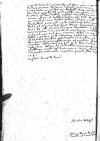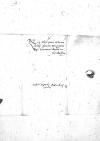De causa ⌊Achatii Grabau⌋ quid actum sit, Reverendissima Dominatio Vestra iam procul dubio cognovit. Cum aliter ⌊illi⌋ succurri non posse viderem, auctor fui, ut peteret remissionem. Cui rei cum intercederet pars appellans, illud tamen effecimus, ut produceretur terminus ad probandum. Sed in ea omnes fuerunt sententia, ut infirmo iure ⌊Achatium⌋ esse dicerent. Elbingensium quoque causa nullum est certum finem sortita, propterea quod processus in illa habitus non probabatur. Nescio enim, quo modo ⌊Iacobus Schroter⌋ actoris personam sustinuit, cum sive ex delegatione, sive ex appellatione pars respondens esse debuerit.
⌊Petrus Brant⌋ fuit hic, sed nihil obtinuit. De quarta modo sollicitus est, quae, si recte memini, decreto regio adempta ⌊ei⌋ non est. Neque recusat ⌊ille⌋, quominus avia bona partiatur, sed ne durius ab eo partitio haec exigatur, id postulat, ut habeatur impensarum ratio, quas fecit in alendam aviam ⌊pupilli⌋ socrum suam, et laborum, quos cum illa sustinuit. Qua in re quin clementer cum ⌊eo⌋ Reverendissima Domination Vestra sit actura, non dubito.
De Donato Sachs promiserat ⌊Hartowski⌋ se scripturum nam cum ego sacerdos sim, licere mihi non videtur, ut de capiendo aliquo litteras conscribam. De ⌊Constellato⌋ nihil prorsus accepi. ⌊Palatinus Marienburgensis⌋ proficiscitur nihilominus, quemadmodum aliis meis litteris scripsi, interdixit ⌊maiestas regia⌋, ne quis in militiam extra regnum proficiscatur. Ad illum etiam scripsit, ne suppetias mitteret rebellibus ⌊caesaris⌋, cuius castra non abesse dicuntur nisi quinque millibus passuum a castris rebellium. Statuit autem cunctando rem restituere neque proelio cum eis decernere, etsi multo numerosiorem habeat exercitum ex lectissimis viris conflatum. Iam in castris rebellium audiuntur voces clamantium: “Geld, geld”, cum interea ⌊caesar⌋ abundet.
Quod a me postulat Reverendissima Dominatio Vestra, ne aegre feram, quod hactenus in eo, quod debebat, solvendo non fuerit. Ego nihil ab ea mihi deberi memini; quod a ⌊Georgio Hegel⌋ numeratum est, ex munificentia Reverendissimae Dominationis Vestrae, non ex  AAWO, AB, D. 19, No. 64_2 eo, quod deberetur, numeratum est. Quo nomine ago Reverendissimae Dominationi Vestrae gratias.
AAWO, AB, D. 19, No. 64_2 eo, quod deberetur, numeratum est. Quo nomine ago Reverendissimae Dominationi Vestrae gratias.
De ⌊uxore Cornelii⌋ egit mecum ⌊Lucas Helm⌋ eo ipso die, quo discessit. Quem ego, ut cum hidden by binding⌈[m]m hidden by binding⌉ ⌊reverendissimo domino⌋ ageret, sed quod quidem ego sciam, ne verbum quidem ullum ei fecit. Appellationem coram notario et testibus factam non vidi, neque quem prosequi eam vellet, audivi. Itaque quid faciendum porro sit, nescio.
Palatinus Pomeraniae datus est ⌊is⌋, quem voluimus. Quam dignitatem Deus ut ⌊illi⌋ fortunet, precor. Mandatum ⌊ei⌋ esse, ut perceptam anni praeteriti accisam in conventu proximo reponat, non memini, sed si me non fallit memoria, quod reliquum restat, exigendum id, ut tribus clavibus asservaretur, praeceptum est. Non vacavit quaerere litterarum exemplum ad ⌊eum⌋ scriptum, sed poterit ex ipso Reverendissima Dominatio Vestra rectius cognoscere.
Quam ut in multos annos incolumem hidden by binding⌈[m]m hidden by binding⌉ et felicem conservet, Deum precor atque illius me gratiae commendo.
 AAWO, AB, D. 19, No. 64_2 eo, quod deberetur, numeratum est. Quo nomine ago Reverendissimae Dominationi Vestrae gratias.
AAWO, AB, D. 19, No. 64_2 eo, quod deberetur, numeratum est. Quo nomine ago Reverendissimae Dominationi Vestrae gratias.


